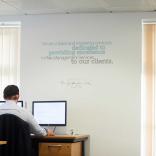How did you get into the industry?
As has often been the case for me, it came from a coffee with someone in my network, having just left IBM where I’d been running Corporate Affairs. I became the fourth member of staff in the second Starling Bank team, and enjoyed four and a half fabulous years building a challenger bank.
Can you describe a key decision or ‘fork in the road’ that had a big impact on your career?
Interesting question, and having reflected, yes I can. I started an IBM Secondment Programme in 2008 when at the beginning of the financial crash. Having just completed my sponsored MBA I had been identified as top talent who were encouraged to broaden our skills base. I spent two years with Business in the Community in the two years leading to the Equality Act 2010, when there was a real drive for gender inclusivity in senior management. I was introduced to government, policy, and I worked alongside truly inspiring senior leaders who were passionate about business for good. It gave me a completely different perspective on the working world.
What do you love about working in fintech?
I’m passionate about creating possibilities through innovative technology to make the world better. My career has two continuous threads – technology, and inclusive fairness - fintech brings both together in the world of financial services.
I was one of the founders of Starling Bank in 2015 when it really wasn’t cool to be a banker. We were inspired to build a challenger bank open for all, a bank with the customer at heart. We pioneered freezing cards, accounts with instant notifications, gambling blocks for customers with addictions, putting the management of people’s money into the palm of their hand – things we take for granted across the banking sector today.
I guess imitation is the sincerest form of flattery!
I think it was an advantage for me not being a career banker or technologist – I always looked at things through a consumer lens, challenging some über smart people at Starling to collectively develop the required solutions. I’ve seen that in the sector here in Wales – creating fintech solutions for the masses that were previously only available to the privileged few.
How did you become aware of the opportunities within the sector in Wales?
Last year I was driving down to my house in Swansea, where my Welsh speaking Father grew up, thinking about my next move. I had previously co-chaired the FinTech Wales awards, and became hugely impressed with the amazing things going on here, from entrepreneurs, start-ups, scale-ups to major players, and so when the opportunity arose to become FinTech Wales’ first CEO, I jumped at it.
Who were your role models as you progressed in the industry?
It’s really unfair to single anyone out, I’ve had the great privilege to work with so many wonderful, generous people, but my guiding lights were always my parents. I think I’ve taken the art of listening, conversation and the value of connections from my Welsh father, mixed with the organisational skills and confidence to try anything from my working mother.
What would you tell your 18 year old self?
Be braver. It’s better to fail than not try - that’s my mum coming out. Don’t let the imposter syndrome hold you back – we are our only inhibitors.
What are the biggest challenges that you’ve seen off so far? As an industry, what’s been learned from such challenges? The challenge for disruptors, new entrants and established players is always staying relevant to customers. The financial sector was slow to adapt to digital technology, then along came the disruptors in 2014 and ’15 and they capitalized on smart phones’ ability to put financial management literally into people’s own hands.The popularity of banking apps has rocketed in the pandemic. Some six million people downloaded an app for the first time in the first month of the pandemic – that’s a significant shift in adoption rates.
There are a number of women in key senior roles in Fintech in Wales – why do you think that is?
Firstly, I think it’s brilliant! The industry is thriving here, giving plenty of opportunity to progress your career; there are successful roles models, the community is inclusive; I have been made to feel really welcome. Oh, and let’s not forget, it’s a beautiful place to live with beaches and mountains, a fabulous place for any working mum to want to raise a family.
What are the advantages and challenges associated with being based in Wales?
I’ve been working remotely since I took up post late last year, as a consequence of the pandemic, so I’m looking forward to discovering a lot more, but it’s a great country to live and work in – beautiful, proud, cultural, and two hours from the financial centre of London.There are established brilliant fintechs already here, comparison sites were invented in Wales. There are great universities and higher education providers growing the talents and skills of the future, upskilling our AI and software engineers, for example. And I’ve certainly met some truly inspirational leaders in Wales.The challenge is for fintechs here to shout louder about where they were born and built.
Why has Wales developed this strong reputation as a centre for Fintech?
Fintech in Wales has a lot to thank Admiral for. Employee ownership, insurance propositions that consumers wanted, and a spirit of entrepreneurialism created a terrific legacy here, a real sense of community, of an ecosystem built on collaborative partnerships with skilled workforces. It’s now up to us to develop this further through relationships with government, regulators, businesses, academia and communities.
What are the biggest changes you’ve seen in the industry during your time?
The larger banks have come to realise that the challengers, the disruptive new kids on the block are now serious players, and they’ve adapted and adopted many of their tools and technologies. The challenge for the new entrants is to always keep current. In time, if not careful, the latest challenger becomes the legacy provider.
What’s the opportunity for the sector?
We have really solid foundations on which to build. The pandemic has shown how we can maintain high productivity whilst operating effectively remotely. The increase in digital adoption, the ability to live anywhere, to be kinder to our planet with flexible working patterns being normalized. Wales becomes even more attractive for a wider, diverse workforce across the entire sector.
Where should we focus our energies, and what is the road map to get there?
We need to really understand the factors that have got us to this place so far, and continually review this. For example, we are currently conducting research with Cardiff Capital Region to identify the factors that have delivered such an effective fintech ecosystem in Wales, to ultimately enable further growth and success. We are thriving, and it’s exciting – but this is just the start!
Where do you see Welsh fintech in 5 years? 10 years?
The future is huge. If we can inspire today’s Welsh school leavers to be part of this sector, then I’m confident we will have another FTSE 100 in our community. What’s going on here is amazing. I feel privileged to be part of it.
What obstacles need to be overcome for the Welsh fintech sector to reach its potential?
We need to be bolder and shout louder about our achievements. We have brilliant businesses competing on the global stage, winning business against some very established brands, let’s not keep this a secret.
What do you see as being the most important areas or opportunities for collaboration in fintech, either in-Wales or internationally?
Success to date is based on collaboration - we at Fintech Wales intend to build on this. Later this year we will be launching a Fintech Foundry. With support from truly amazing Welsh businesses and world class tech providers, we aim to nurture the next generation of entrepreneurs. We have to think more broadly than just Wales. The UK is a global leader in fintech, and if we are to retain this position, FinTech GB needs us to talent scout tomorrow’s leaders – we need the fintech equivalent of spotting Alun Wyn Jones on the muddy pitches of Bonymaen and developing him to be the Wales and British Lions legend we recognise today.
For more information on FinTech opportunities in Wales click here




